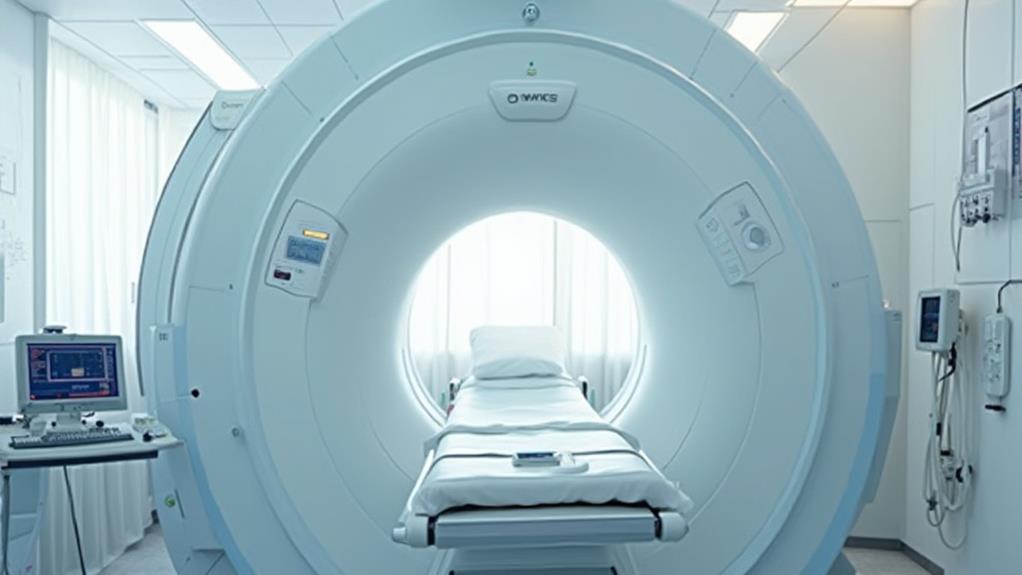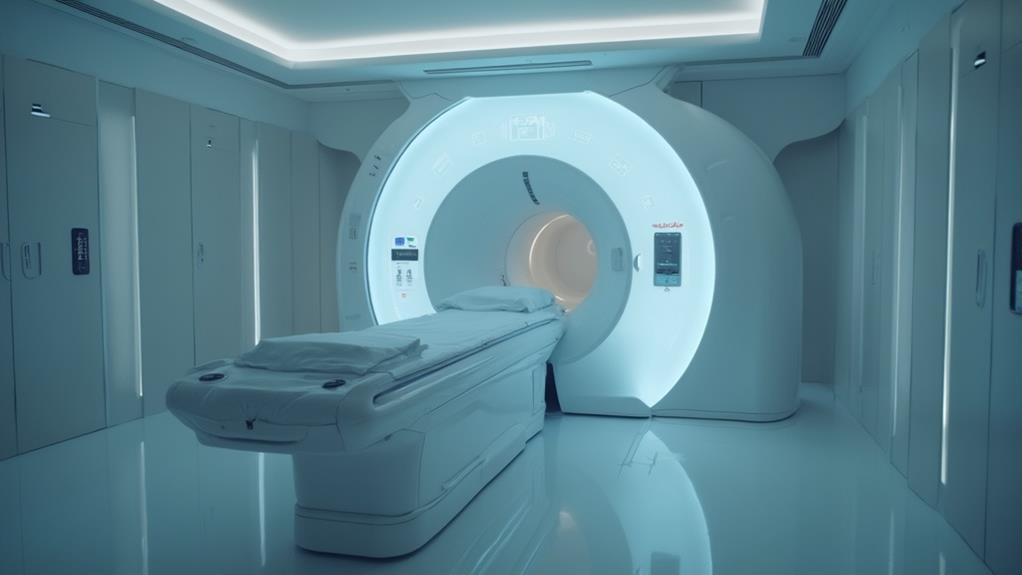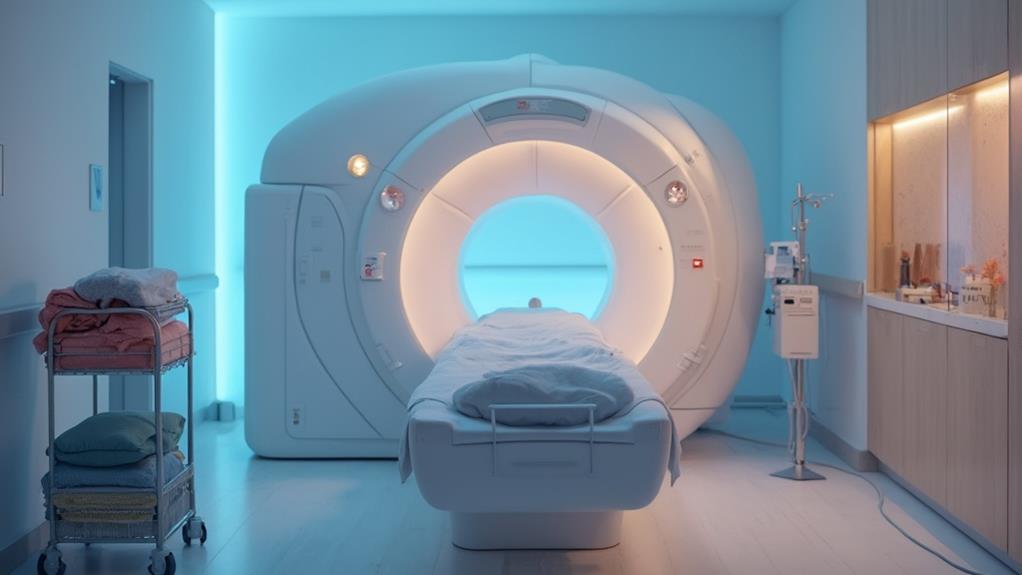Preparing for an MRI scan involves understanding the procedure and following specific pre-scan instructions. Remove all metallic objects, and disclose any metal implants or devices to the medical staff. Wear loose-fitting clothing, and adhere to any fasting or hydration guidelines provided. If a contrast agent is required, you will be informed about its purpose, potential side effects, and will need to give consent. Arrive early to manage anxiety and allow time for travel. Communicate any concerns or claustrophobia with the staff. Post-scan, rest and hydrate, and report any unusual symptoms. Learn more about managing the entire process efficiently.
MRI Highlights
- Remove all metallic objects and wear comfortable, loose-fitting clothing.
- Inform the facility of any metal implants, devices, or allergies.
- Practice relaxation techniques and communicate any anxiety to the staff.
- Arrive early to account for potential delays and complete pre-scan paperwork.
- Follow fasting or hydration instructions, if applicable, and report any unexpected symptoms post-scan.
MRI Scan Definition

An MRI, or Magnetic Resonance Imaging, scan utilizes powerful magnets and radio waves to generate detailed images of the body's internal structures. This sophisticated imaging technology is non-invasive and does not use ionizing radiation, making it a safer alternative for various diagnostic purposes.
MRI scans are employed to examine organs, tissues, and the skeletal system, aiding in the diagnosis and monitoring of numerous medical conditions. MRI is particularly valuable in creating high-resolution images of the brain and spinal cord, which can help detect issues such as herniated discs and spinal cord abnormalities.
MRI: Acronym Unpacked
Magnetic Resonance Imaging, commonly known as MRI, is a powerful diagnostic tool used in the medical field to create detailed images of the internal structures of the body. This imaging modality employs a combination of strong magnetic fields and radio waves, coupled with advanced computer systems, to generate high-resolution images without using ionizing radiation.
MRI stands for Magnetic Resonance Imaging, elucidating the technology's core components. "Magnetic" refers to the strong magnetic fields utilized to align the protons in the body's hydrogen atoms. "Resonance" involves the application of radio waves to disturb this alignment, causing the protons to emit signals as they return to their original state. These signals are then interpreted to create images. Finally, "Imaging" denotes the resultant detailed pictures obtained from this process.
This non-invasive technique is invaluable for diagnosing and monitoring various medical conditions. It provides superior contrast between different soft tissues, making it particularly useful for brain, spinal cord, and musculoskeletal system evaluations. Its precision aids healthcare professionals in making informed decisions, ultimately enhancing patient outcomes. Proper understanding of MRI helps patients can effectively prepare for and undergo the scan, contributing to accurate diagnoses and ideal care plans.
Imaging Technology Basics
Understanding the basics of imaging technology, particularly the MRI scan, provides a solid foundation for appreciating its medical applications. Magnetic Resonance Imaging (MRI) employs a powerful magnetic field, radio waves, and a computer to generate detailed images of the body's internal structures. Unlike X-rays or CT scans, which use ionizing radiation, MRIs rely on non-ionizing radiation, making them a safer option for many patients.
The MRI machine consists of a large, circular magnet with a tunnel at its center. Patients lie on a movable examination table that slides into this tunnel. The magnetic field temporarily realigns hydrogen atoms present in the body's tissues. When the magnetic field is turned off, these atoms emit radiofrequency signals as they return to their original positions. These signals are captured and converted into digital images by the computer.
This technology excels in distinguishing between various types of soft tissues, making it invaluable for diagnosing conditions affecting the brain, spine, joints, and organs. The resulting images are highly detailed, providing clear differentiation between normal and abnormal tissues, which aids healthcare professionals in making accurate diagnoses and planning appropriate treatments.
Purpose and Uses
The primary purpose of a Magnetic Resonance Imaging (MRI) scan is to provide high-resolution images that reveal the intricate details of the internal structures of the body, facilitating accurate medical diagnoses. This non-invasive imaging modality works by using powerful magnets and radio waves to generate detailed images of organs, tissues, and skeletal structures. Clinicians rely on MRI scans to investigate a variety of medical conditions, especially when a high degree of contrast between soft tissues is required.
MRI scans are extensively used in neurology to diagnose brain abnormalities, such as tumors, strokes, and demyelinating diseases like multiple sclerosis. Additionally, they play a critical role in musculoskeletal radiology, evaluating joint injuries, soft tissue masses, and spinal pathologies.
Cardiologists employ MRI to analyze heart structures, blood flow, and detect congenital heart diseases. Oncologists also benefit from MRI's ability to delineate the extent of tumors and monitor treatment response.
The utility of MRI extends to detecting liver diseases, examining glandular functions, and guiding interventional procedures. Given its versatility, MRI is indispensable in modern medical diagnostics, empowering healthcare professionals to offer targeted treatments, improving patient outcomes, and ultimately enhancing the ability to serve and care for those in need.
Benefits

The benefits of MRI scans are substantial, starting with their ability to facilitate early detection of various medical conditions. As an accredited facility focused on patient comfort, MRIs provide high-precision imaging with no exposure to radiation.
This makes MRI an essential comprehensive diagnostic tool for accurately examining and monitoring patient health. The procedure is non-invasive, offering a high degree of comfort and allowing for the high-resolution photos necessary for precise medical evaluations.
Early Detection Advantages
One pivotal advantage of early detection through MRI scans is the potential for timely intervention, which can drastically improve patient outcomes. By identifying abnormalities such as tumors, lesions, or vascular anomalies at an early stage, medical professionals can initiate appropriate treatments sooner. This early intervention often leads to more positive prognoses and increased survival rates.
MRI scans offer unparalleled detail in imaging soft tissues, which is essential for detecting conditions that might be missed by other modalities. For instance, early detection of neurological conditions like multiple sclerosis, or musculoskeletal issues such as ligament tears, can lead to more effective management and improved quality of life. Additionally, when it comes to cancer detection, the early identification of malignant growths can remarkably affect treatment options, providing more opportunities for less invasive procedures and preserving more healthy tissue.
Moreover, early detection through MRI can also prevent the progression of certain diseases. By diagnosing conditions before they worsen, it reduces the burden on patients and healthcare systems. This approach not only optimizes individual patient care but also promotes more efficient use of medical resources, aligning well with the noble aim of serving others through healthcare.
Non-Invasive Procedure
MRI scans are a powerful diagnostic tool primarily because they are non-invasive, offering considerable benefits to patients. Unlike procedures requiring surgical intervention or internal examination, MRIs utilize strong magnetic fields and radio waves to produce detailed images of the body's internal structures. This approach eliminates the need for incisions or exposure to ionizing radiation, consequently minimizing risks and discomfort.
Patients undergoing MRI scans benefit from a relatively stress-free experience. The procedure typically involves lying still in a spacious, open-ended tube, which many find to be more comfortable compared to other diagnostic methods. The non-invasive nature of MRI scans means there is no recovery time, allowing patients to resume daily activities immediately after the procedure.
Additionally, MRI scans can be repeated with minimal risk, making them an ideal choice for ongoing monitoring and management of chronic conditions. This repeatability is particularly valuable for tracking the progression of diseases or the efficacy of treatments, thereby aiding in the delivery of timely and accurate medical care. Overall, the non-invasive nature of MRI scans greatly enhances patient safety and convenience, fostering a more efficient and compassionate healthcare experience.
High Imaging Precision
High imaging precision stands as one of the most significant benefits of MRI scans, enabling unparalleled diagnostic accuracy. This high level of detail is achieved through the use of powerful magnetic fields and radio waves, which create detailed cross-sectional images of the body's internal structures.
These high-resolution images allow healthcare professionals to identify abnormalities in tissues, organs, and other body parts that might be missed with less sophisticated imaging techniques.
Such precision is particularly important for diagnosing complex conditions, including neurological disorders, musculoskeletal issues, and various forms of cancer. By providing an extraordinarily detailed view of the body's internal landscape, MRI scans facilitate more accurate assessments and, consequently, more effective treatment plans. This directly contributes to the well-being of patients, ensuring they receive appropriate care tailored to their specific medical needs.
Additionally, the precise imaging capabilities of MRI help in monitoring disease progression and the effectiveness of therapeutic interventions over time. For patients, this means better-informed medical decisions and improved outcomes. The high imaging precision of MRI therefore not only aids in initial diagnoses but also plays a pivotal role in ongoing patient care and management, underscoring its significance in modern medicine.
Comprehensive Diagnostic Tool
Leveraging the unparalleled detail afforded by high imaging precision, MRI scans serve as a thorough diagnostic tool that goes beyond simple imaging. The extraordinary capabilities of MRI technology in rendering detailed anatomical and physiological views enable healthcare providers to achieve a higher level of diagnostic certainty. This contributes substantially to patient care and treatment outcomes, emphasizing its value in the medical field.
The benefits of utilizing MRI scans as expansive diagnostic tools include:
- Multiplanar Imaging: MRI can capture images in multiple planes, offering a three-dimensional perspective that enhances the assessment of complex structures.
- Non-Invasive and No Radiation: Unlike X-rays or CT scans, MRI uses magnetic fields, rendering it a safer option for patients, especially those requiring frequent imaging.
- Detailed Soft Tissue Evaluation: MRI excels in differentiating between various soft tissues, pivotal for diagnosing conditions involving organs, muscles, and nerves.
- Functional Imaging: Beyond anatomy, functional MRI (fMRI) assesses physiological processes, such as blood flow and brain activity, enriching diagnostic insights.
- Early Detection and Monitoring: The high-resolution imaging aids early detection of diseases and monitors treatment effectiveness, ultimately fostering proactive healthcare.
Scan Time Expectations

Understanding the time involved in an MRI scan is vital for effective planning. The duration of the procedure varies, but typically ranges from 15 minutes to over an hour, depending on the type and area being scanned. Below is a table summarizing key aspects that can help manage your schedule around the MRI appointment:
| Aspect | Expected Time | Notes |
|---|---|---|
| Initial Setup | 10-15 minutes | Includes changing clothes and positioning |
| Actual Scan Duration | 15-60+ minutes | Varies by body part and specifics required |
| Post-Scan Processing | 5-10 minutes | Time taken to dismount and change clothes |
Duration of Procedure
When preparing for an MRI scan, patients often wonder about the duration of the procedure. Understanding the expected time frame can help individuals approach the experience with greater ease and preparedness. The length of an MRI scan varies depending on the type and complexity of the imaging required. Generally, MRI procedures range from 20 minutes to one hour.
Several factors influence the duration of an MRI scan:
- Type of MRI: Different scans such as brain, spine, or abdominal MRIs have varying durations.
- Presence of contrast agents: Some scans require contrast agents, which involve additional time for administration and imaging.
- Patient's compliance: Remaining still during the scan is paramount; any movement can extend the procedure.
- Specific instructions: Some tests require preliminary preparations or multiple sequences, influencing the total time.
- Technical factors: Machine efficiency and availability of advanced equipment also play a role.
Recognizing these variables can aid in mental readiness and scheduling. It's advisable to consult with healthcare providers to get a detailed estimate based on individual circumstances. Prior knowledge of the expected duration will make the MRI experience more manageable and less formidable for patients.
Time Management Tips
Efficient time management is essential when anticipating an MRI scan, as it directly impacts your overall experience and minimizes stress. The total time commitment typically includes preparation and the scan itself, spanning one to two hours. It's prudent to arrive 15-30 minutes prior to your appointment to complete necessary paperwork and address any preliminary checks like changing into a gown.
Allocate additional time for potential delays, as medical facilities may experience unforeseen hold-ups. Familiarize yourself with the location of the MRI facility, planning your route and parking arrangements in advance to avoid last-minute confusion. If using public transport, guarantee schedules align with your appointment.
Inform the medical staff promptly if any emergencies arise, causing delay, as they can often accommodate slight variations in timing. Pre-scan instructions may require specific preparations, such as fasting or adjusting medication schedules; adhere to these guidelines meticulously to ensure ideal scan outcomes.
Lastly, managing post-scan commitments is vital. Factor in possible time to change back into your clothes and attend a brief debriefing session. This systematic approach ensures you remain composed and punctual, helping you serve your well-being and maintain a balanced schedule.
Busy Schedules Considerations
Managing a busy schedule while accommodating an MRI scan requires strategic planning and realistic expectations about the time commitment involved. Understanding the time needed for the entire process, including preparation and post-scan activities, is essential for effective scheduling. MRI scans typically last between 30 to 60 minutes, but additional time must be allocated for paperwork, changing into appropriate attire, and briefings by medical staff.
To manage your schedule efficiently, consider the following points:
- Arrival Time: Arrive at least 15 to 30 minutes prior to your appointment to complete any necessary forms and address administrative steps.
- Waiting Periods: Be prepared for potential delays, as previous appointments or unforeseen circumstances may extend your waiting period.
- Post-Scan Recovery: Allow time post-scan for any brief recovery period, particularly if contrast agents were used, which might necessitate monitoring.
- Travel Considerations: Account for travel time to and from the facility, ensuring your schedule accommodates potential traffic or public transport delays.
- Workspace Arrangements: For those balancing work, consider notifying your employer and arranging for coverage or flexibility around your appointment time.
MRI FAQ
Are There Any Dietary Restrictions Before an MRI Scan?
There are generally no dietary restrictions before an MRI scan. However, specific instructions may vary based on the type of MRI or if contrast material is used; always consult with your healthcare provider for tailored guidance.
Can I Wear Makeup or Deodorant on the Day of the MRI?
It is advisable to avoid wearing makeup or deodorant on the day of the MRI. Certain products may contain metallic components that could interfere with the imaging process, ensuring the most accurate results for patient care.
Should I Remove Piercings Before an MRI Scan?
Yes, it is advisable to remove piercings before an MRI scan to guarantee the safety and accuracy of the procedure. Metallic objects can interfere with the magnetic field and may pose risks or negatively impact image quality.
Are MRIS Safe During Pregnancy?
MRI scans are generally considered safe during pregnancy, particularly when essential for diagnostic purposes. However, it's advisable to consult with your healthcare provider to weigh potential risks and benefits for both mother and child.
What Should I Do if I Feel Claustrophobic During the Scan?
If you experience claustrophobia during the scan, inform the technician immediately. They are trained to help alleviate your discomfort, potentially by offering calming techniques, providing a mild sedative, or using an open MRI machine if available.
